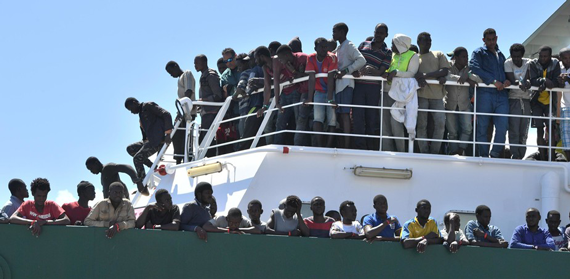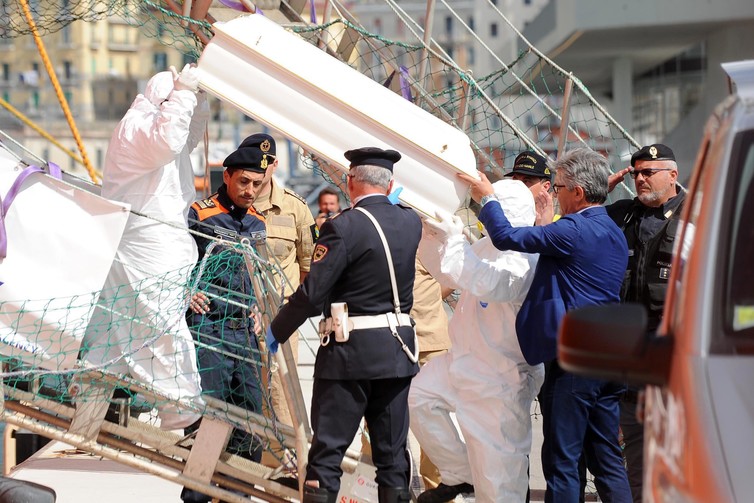A ship with rescued migrants arrives at the Italian port of Salerno in late June. Ciro Fusco/EPA
Guest post by Simon McMahon, Centre for Trust, Peace & Social Relations
Tensions in European politics around the arrival of migrants across the Mediterranean Sea escalated in late June as the Italian government suggested that it could prohibit NGO ships which had rescued people at sea from docking in its ports.
Italy’s ambassador to the EU told the EU’s migration commissioner that the situation in the country was “at the limit” and “unsustainable”. Italy’s prime minister, Paolo Gentiloni, also implored other European countries to stop looking the other way because the situation was “no longer sustainable”.
This is a risky move. Prohibiting rescued migrants from arriving in ports is unlikely to be possible in practice and could go against international law. In the meantime, the political rhetoric is poisoning the way search and rescue at sea is seen in Italy and giving credence to the anti-migrant views of an emboldened far-right. What happens next will be a major test of Europe’s capacity to come up with better ways of responding to migration across the Mediterranean.
Legal difficulties
According to the International Convention on Maritime Search and Rescue, states and ships have an obligation to go to the assistance of nearby vessels in distress. Following rescue operations there is also an obligation that rescued people are taken to safety, regardless of their nationality, status or the circumstances in which they are found. In the Mediterranean this means migrant boats in distress should not be left to sink, nor should they be sent back to Libya, where most of them are now coming from.
In practice, stand offs between migrant boats and the Italian authorities have already happened before. In 1991, the Vlora, a freighter full of people fleeing Albania, was initially blocked from entering the port of Bari but landed anyway with conditions on board rapidly deteriorating. In 2004, the Cap Anamur, a German aid ship, rescued 37 people from a dinghy between Libya and Italy but was stopped from entering Italian ports. After a two-week standoff they were allowed to land when the deteriorating physical and psychological well-being of everyone on board was said to be putting the ship and crew in danger.
These historical stand offs suggest that the current tensions are a bluff – ships are eventually allowed to land. Italy is using the threat to press their European neighbours for increased support.
So far, however, an expression of “strong solidarity” on July 3 from the French and German interior ministers has offered little in terms of positive, concrete developments. A code of conduct for NGOs will now be drafted by Italy, despite the fact that Mediterranean search and rescue organisations already have one. The Libyan coastguard will be given increased training and financial support but they’ve proved to be unpredictable partners, shooting at migrants and rescue boats.
Efforts will also be made to improve facilities for migrants in Libya but this is likely to be a slow process as the country remains mired in political chaos and insecurity, with migrants held in crowded, unsanitary and often violent detention centres. In any case, Libyan coastguards and other authorities are also reported to have links with migrant smuggling.
Italy may also demand that ports of other countries within Europe or nearer to Libya accept rescue boat disembarkations. A stepping up of refugee relocation out of Italy would be welcome too. In September 2015 it was said that 39,600 relocations would take place from Italy within two years. So far, only 20% of that figure has been achieved and some EU member states have refused to take anyone in at all.
Blaming NGOs
The threat to close Italy’s ports also heralds a worrying escalation of anti-NGO rhetoric within the country. For a while now, rescue operations have been presented by critics as a “pull factor” which makes the dangerous journey across the sea appear less risky to migrants. At the end of 2016, the FT reported that Frontx, the EU’s border management agency, had circulated confidential reports claiming that NGOs in the Mediterranean worked in collusion with smugglers. A few months later, a prosecutor in Italy publicly claimed that he had evidence of it.
Another nail in Europe’s coffin. Why are you flooding europe with economic migrants? Your agenda needs scrutinising.
— pj (@pj147771) June 29, 2017
Political debate fed off these rumours with increased criticism of search and rescue. In April, Luigi di Maio from the Movimento 5 Stelle (Five Star Movement), deplored what he called a “taxi service” being run by NGOs for illegal migrants. Matteo Salvini of the Lega Nord party which has long held an anti-immigrant stance, followed up by stating that Italian secret services had a file recording relationships between smugglers and NGOs. The president of Italy’s parliamentary committee for control of the secret services later denied this.
Despite making public statements about smuggler-NGO collusion, the prosecutor looking into the allegations at the time had also not yet opened a criminal investigation. He later said that he did not have enough proof.
But xenophobic far-right groups were emboldened. In May, an organisation known as Generazione Identitaria physically blocked an NGO ship from leaving port to carry out operations. It has since started crowdfunding to take its own missions at sea to prevent rescues taking place.
Critics have been vocal, and if their claims are justified then it is right that investigations are carried out. But so far, evidence has not been presented. A recent research project found that claims of collusion were based on “biased analysis and spurious causality links”. This is supported by research my colleagues and I did for the MEDMIG project in 2015, when we found that migration across the Mediterranean towards Italy was driven more by a need to get out of Libya than by the prospect of being rescued. Many of the people we spoke with knew that they could die at sea, but still considered that to be better than staying where they were.
A coffin carrying the body of a three-year-old child is carried off a ship in Salerno in May. Massimo Pica/EPA
The threat to close ports shows the governing Partito Democratico to be taking a harder line in its rhetoric on migration. It follows disappointing local elections in late June, and a more vocal anti-migrant stance from the Movimento 5 Stelle’s mayor of Rome.
But the government is also undermining humanitarian work at sea without finding an effective replacement. As noted by Aurelie Ponthieu, a humanitarian specialist on displacement at Medecins Sans Frontieres, search and rescue at sea is not perfect and cannot go on indefinitely. But for now, Europe’s proposals lack a clear, decent long-term alternative to letting people drown.
Originally written for ‘the Conservation’.





Comments are disabled